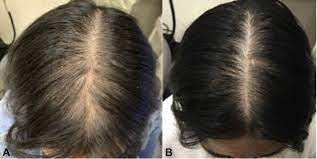A post-op hair treatment can be a frustrating experience, but there are ways to increase your hair increase rate after surgery. In this article, we'll discuss some of the most effective tricks to speed up your hair regrowth and help restore your confidence. We'll also provide some tips on how to find a Hair Transplant Clinic in Gurgaon, so you can feel confident about your appearance again. Read on to learn everything you need to know about post-op hair growth!
Teloses effluvium (TE), a condition caused by a disruption in normal hair follicle cycling, usually causes hair loss after surgery. However, certain health events, such as surgeries or underlying medical conditions, can cause hair follicles to stop producing hair. While hair loss following surgery is possible, it is typically only temporary.
After surgery, what
causes hair loss?
In a
typical hair cycle, your follicles go through a growth process that lasts a few
years at a time. Hair follicles don't produce new hairs all the time; they go
through resting periods known as diligence.
According
to the Hair Loss Association, ten to twenty percent of your hair follicles are
in the telegenic stage. If the proportion of telegenic hairs is greater than
20%, it shows telegenic effluvium, one of the most common types of hair loss.
Surgery can cause your hair follicles to rest for longer periods than usual.
Surgery may cause
TE-related baldness in the following ways:
A
tension procedure is an invasive procedure that can put your body — and mind —
under a great deal of strain. According to the Skin Association, hair loss
following a major stressful event of this nature is most likely to occur within
3 to 6 months.
Hair
growth requires specific nutrients, including:
·
Biotin
·
Iron
·
Zinc
·
Protein
Stressful
events, such as surgery, may cause your body to divert nutrients away from your
vital organs. This can cause hair loss and TE.
Alopecia
aerate
This
type of hair loss occurs when your head is in one position for several hours at
a time, according to a research review. Blood flow to your hair follicles may
get reduced. Positional alopecia is less common in short procedures because
your head isn't in one place for too long.
Someone
has reported this type of hair loss in cardiac surgery, according to the same
review. Because of the time spent laying in one position, positional alopecia
is also possible after extensive reconstructive surgeries.
Anesthesia
While
it is still debatable, some doctors believe there is a link between anesthesia
and hair loss, especially with surgeries lasting many hours, according to a
board-certified plastic surgeon. Long anesthetic periods may cause TE-related
hair loss by reducing cell division. The slower cellular division may inhibit
follicle production.
However, medical trials have not shown this. The type of anesthesia used may also contribute to hair loss. Hypotensive anesthesia, which is commonly used in maxillofacial surgeries, increases the risk of positional alopecia.
Side effects of
medications
Certain
post-surgery medications, particularly whether you are sensitive to them, could
indeed cause hair loss.
·
Anticonvulsant
drugs
·
Thyroid
hormone antagonists
·
Beta-blockers
·
Surgical
procedure
It's also crucial to think about the location of your surgery. While all surgeries have the potential to cause TE and hair loss.
Conclusion
Post-operative
hair growth rates are often below the requirements set by medical
professionals. Various factors can affect it, such as the type of Direct Hair Transplant, age, and
genetics, but one of the most common reasons for slow hair growth is a lack of
nutrients for the hair follicles. Fortunately, there are some tricks that you
can use to boost your post-operative HairTransplant in Gurgaon and make all the difference! Stay tuned for more
exciting blog posts in this category!
Also CheckOut: Why Hair Transplant is important to grow natural Hair back?

No comments:
Post a Comment